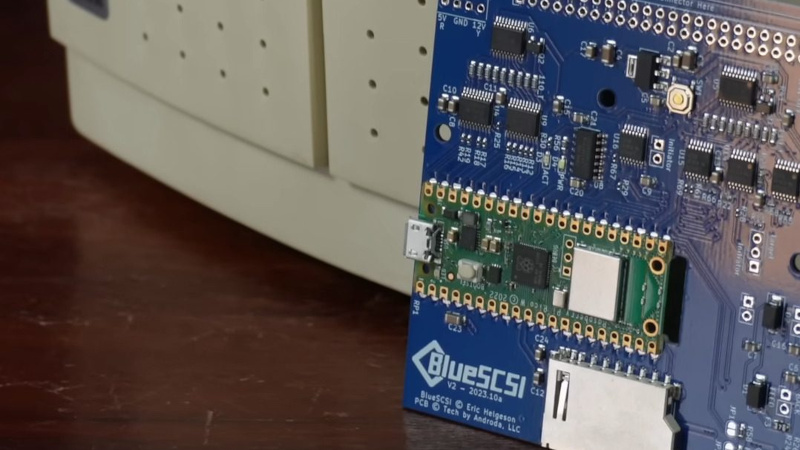Anyone into retro Macintosh machines has probably heard of BlueSCSI: an RP2040-based adapter that lets solid state flash memory sit on the SCSI bus and pretend to contain hard drives. You might have seen it on an Amiga or an Atari as well, but what about a PC? Once upon a time, higher end PCs did use SCSI, and [TME Retro] happened to have one such. Not a fan of spinning platters of rust, he takes us through using BlueSCSI with a big-blue-based-box.
Naturally if you wish to replicate this, you should check the BlueSCSI docs to see if the SCSI controller in your PC is on their supported hardware list; otherwise, your life is going to be a lot more difficult than what is depicted on [TME Retro]. As is, it’s pretty much the same drop-in experience anyone who has used BlueSCSI on a vintage Macintosh might expect. Since the retro-PC world might not be as familiar with that, [TME Retro] gives a great step-by-step, showing how to set up hard disk image files and an iso to emulate a SCSI CD drive on the SD card that goes into the BlueSCSIv2.
This may not be news to some of you, but as the title of this video suggests, not everyone knows that BlueSCSI works with PCs now, even if it has been in the docs for a while. Of course PCs owners are more likely to be replacing an IDE drive; if you’d rather use a true SSD on that bus, we’ve got you covered.
















if you need a different scsi option there’s so the zuluscsi. never used one but they seem as good or better for some uses. the bluescsi is a lovely tool for anything you can throw it at though, and impressively affordable.
Um I mean why wouldn’t it its a scsi device if your compoofer has scsi host 2+2= no shit
I spoke to the maintainer of BlueSCSI after the video was released. He confirmed they do expect compatibility to be universal, though they still recommend people review the confirmed compatibility list, and more importantly feed back if they do experience any issues so they can be investigated.
(As a background: ZuluSCSI and BlueSCSI v2 use mostly the same code for SCSI communications. This is based on the SCSI2SD project and the code I have written for ZuluSCSI.)
I can confirm that most of the testing has been done on PC platforms, just because it is easier.
Of course every now and then there pop up weird issues with some specific platform, and old Apple systems have particularly many quirks.
SCSI wasn’t quite the ‘USB’ of it’s time, meaning there are some compatibilities. I use a BlueSCSI v2 on my SGI Indigo 2 and I’ve had to work with the developers to get it working again after firmware updates.
I mean, BlueSCSI can work on basically anything, depending on what compatibility options you select.
Same thought, I have never had any interoperability issues with SCSI. It just…. is.
Last month at VCFMW the BlueSCSI guys were showing pictures of what looked like an PATA/IDE native prototype. I imagine that this (BlueIDE?) would work better than the cheap kludgy IDE to SD card adapters currently on the market.
That is the PicoIDE by Ian Scott (polpo) who also created the PicoGUS – coming soon!
Because CF is closely related to IDE/PATA, CF cards, unlike SD cards, only require a passive adapter. In many cases, this is a better solution than SD.
This is why I used CF on my PowerMac G4
I have the opposite problem, too many old HDDs that I never got rid of and no retro PCs to use them with, I have made several attempts in the past 10 years to try starting up a project to get a really old ThinkPad up and running or I would eyeball one of those really old Apple II computers for sale online, but never went anywhere with them.
Still it’s really cool to see stuff like this keeping older systems alive, makes me wonder in just 5 to 10 years how many older PCs from the 80’s and 90’s will still be usable.